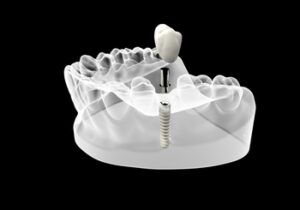Embarking on the journey of dental implantation, particularly for a single-tooth implant, involves understanding a myriad of factors, including the cost of dental implants in Australia. This introductory section aims to shed light on dental implants as a viable solution for replacing missing teeth, highlighting the intricacies of the dental implant procedure and its impact on oral health.
Dental implants are a revolutionary approach to tooth replacement, offering a more permanent and natural-looking solution than traditional methods like dental bridges. The process involves implanting a metal post into the jaw bone, supporting an artificial tooth. This approach provides a natural appearance and helps preserve the jaw bone, preventing bone loss commonly seen with missing teeth.
This article focuses on single-tooth implants, a popular choice for replacing a missing or damaged tooth. We’ll explore the factors contributing to the single-tooth implant cost in Australia, including the complexity of the implant procedure, the potential need for a bone grafting procedure, and the fees associated with the dental practice. Additionally, we’ll examine how dental health insurance benefits might offset some of these costs.
In this comprehensive guide, we aim to provide readers with a clear understanding of what to expect from a single-tooth implant, including the dental implant costs, the stages of the dental implant procedure, and the benefits of choosing this method of tooth replacement over others. Our goal is to equip you with the knowledge to make informed decisions about your dental treatment.
Understanding Dental Implants: A Closer Look
Dental implants are a groundbreaking solution for replacing missing or damaged teeth. In dental procedures, the implant stands out for its ability to replicate the form and function of natural teeth. Especially for single-tooth implants, the technology offers an unparalleled blend of aesthetics and functionality.
Dental Implant Procedure: A Step-by-Step Overview
The journey towards getting a dental implant begins with assessing dental health, including the condition of the jaw bone and surrounding teeth. A bone grafting procedure might be recommended if the jaw bone is insufficient. The implant, a small titanium post, is placed into the jawbone. This surgical procedure is followed by a healing period, during which the bone fuses with the implant, known as osseointegration. Finally, a custom-made dental crown is attached to the implant, providing the look and feel of a natural tooth.
Why Choose Dental Implants?
 Choosing a dental implant over tooth replacement options like dental bridges or dentures has significant advantages. Dental implants offer a more natural appearance and do not require the filing down of adjacent teeth, as is the case with bridges. They are also more stable and comfortable, eliminating the discomfort and inconvenience of removable dentures. While the single-tooth implant cost in Australia might be higher upfront, the long-term benefits for oral health, including preventing bone loss and preserving facial structure, make it a valuable investment.
Choosing a dental implant over tooth replacement options like dental bridges or dentures has significant advantages. Dental implants offer a more natural appearance and do not require the filing down of adjacent teeth, as is the case with bridges. They are also more stable and comfortable, eliminating the discomfort and inconvenience of removable dentures. While the single-tooth implant cost in Australia might be higher upfront, the long-term benefits for oral health, including preventing bone loss and preserving facial structure, make it a valuable investment.
Advantages of Choosing Dental Implants
The benefits of dental implants, especially single-tooth implants, extend far beyond merely filling a gap left by a missing tooth. They offer a permanent solution, integrating with the jaw bone to provide a stable base for replacement teeth. This integration helps maintain the natural structure of the face and jaw, preventing bone loss. Dental implants also offer improved comfort and convenience compared to traditional dentures or bridges, as they do not require removal for cleaning and do not shift or slip inside the mouth. Furthermore, dental implants contribute to better oral health, as they do not necessitate grinding down adjacent teeth, as is often the case with dental bridges. While the dental implant cost might seem higher initially, their durability and minimal maintenance requirements make them a financially viable option over time. Additionally, the success rate of dental implant procedures is high, making them a reliable choice for tooth replacement.
Factors Affecting Single Tooth Implant Costs in Australia
The cost of a single tooth implant in Australia is subject to various factors, each contributing to the final price a patient pays.
Cost Factors Breakdown
- Implant Cost: The cost of the implant, including the materials used for the implant and the crown, is a primary expense.
- Surgical Expenses: The complexity of the implant procedure, which can vary based on individual oral health needs, impacts the cost.
- Additional Procedures: If necessary, procedures like bone grafting or gum disease treatment can add to the overall expense.
- Consultation and Aftercare: Costs for professional consultations and aftercare and maintenance also play a role.
Geographic Cost Variations
Prices for dental implants can vary significantly across Australia. In densely populated urban areas, higher living costs and greater demand for cosmetic dental procedures often result in higher prices. In contrast, rural areas might offer more competitive prices but lack the same dental facilities.
Urban vs Rural Areas
In urban areas, patients might find a wider range of dental professionals offering implants at a higher cost. Rural areas may have fewer dentists, potentially leading to lower costs and requiring travel to urban centres for the procedure.
Average Costs and Price Range in Australia
Dental implants have become a popular solution for replacing missing teeth in Australia. Understanding the cost of getting a single-tooth implant is essential for those considering this option.
Nationwide Cost Overview
The cost of dental implants in Australia is subject to considerable variation. On average, a single dental implant costs around AUD 3,000. This estimate generally includes the implant, the surgical procedure, and the necessary components like the abutment and crown.
Evaluating High-End and Low-End Costs
In major urban centres such as Sydney and Melbourne, the cost of a single tooth implant can exceed AUD 30,000. This is often due to the higher costs associated with operating a dental practice in these areas and using cutting-edge technology and materials. Conversely, in smaller towns or regions with a lower cost of living, the price can be as low as AUD 2,000, although this may not cover additional procedures such as bone grafting or tooth extraction.
Role of Dental Insurance
It’s important to consider the impact of dental health insurance benefits on the overall cost. While some insurance plans might cover a part of the cost, others may not offer any coverage for dental implants, affecting the total out-of-pocket expense for the patient.
The cost of a single tooth implant in Australia varies based on location, the complexity of the dental implant procedure, and the quality of materials used. Prospective patients should seek consultations with various dental professionals to clearly understand the costs involved and the potential need for additional treatments like bone grafting. Investing in a dental implant goes beyond mere tooth replacement; it invests in long-term oral health and well-being.
Financial Solutions for Dental Implants in Australia
Dental implants, including single-tooth implants, represent a significant investment in oral health. In Australia, the cost of dental implants can be a concern for many, making exploring insurance and financing options essential.
Dental Insurance Coverage
Dental insurance in Australia often covers a portion of the cost of dental implants. However, coverage varies greatly between policies, with some insurances covering the implant surgery but not the full dental implant procedure, including necessary additional treatments. Patients should review their dental health insurance benefits carefully to understand what portions of the single-tooth implant cost are covered.
Out-of-Pocket Expenses
Out-of-pocket expenses can be substantial, depending on the extent of insurance coverage. Various factors, including the complexity of the implant procedure and the need for additional dental procedures, influence these costs. Patients should consult with their dental professional to get a detailed estimate of these costs.
Financing Options and Payment Plans
Recognising the financial burden of dental implants, many dental practices offer financing options and payment plans. These arrangements can make the treatment more accessible by allowing patients to pay the cost over time. Discussing these options with your dental office to find a plan that aligns with your financial capabilities is important.
Government Support
The Australian government offers some support for dental treatments through public dental services, although this support is typically limited and subject to eligibility criteria. While these programs may not fully cover the cost of dental implants, they can help reduce the financial burden for eligible individuals.
In summary, managing the financial aspect of getting a dental implant in Australia involves navigating a mix of insurance coverage, out-of-pocket expenses, financing options, and potential government support. It’s essential for patients to thoroughly understand these options and seek advice from dental professionals to make informed decisions about their dental implant investments.
A Step-by-Step Preparation Guide
Getting Ready for Your Dental Implant Procedure
The journey towards a dental implant, a solution for missing or damaged teeth, requires careful preparation. This preparation is key to the success of the procedure and your overall oral health.
Key Steps in Preparing for the Procedure
 Initial Dental Assessment: Your dental professional will thoroughly examine your oral health. This includes evaluating the site for the single dental implant and any surrounding teeth.
Initial Dental Assessment: Your dental professional will thoroughly examine your oral health. This includes evaluating the site for the single dental implant and any surrounding teeth.- Medical Review: Any existing medical conditions, especially those that might impact dental procedures, should be discussed. This is also the time to talk about any medications you are taking.
- Surgical Preparation: Understanding the surgical procedure is crucial. If additional treatments like bone grafting are necessary, your dentist will inform you during this planning stage.
Importance of Dental Advice
Following pre- and post-procedure advice from your dental professional is critical for a successful outcome. This includes dietary advice, oral hygiene practices, and any specific instructions related to your dental health. Being informed about Australia’s single-tooth implant cost and potential dental health insurance benefits is also important for a smooth experience.
Aftercare and Maintenance
The journey of dental implantation, from the initial tooth extraction to the final placement of the single dental implant, is intricate. Understanding the aftercare and maintenance of dental implants is essential for ensuring their longevity and your continued oral health.
The dental implant procedure often involves several steps, including bone grafting if there’s significant bone loss in the jaw and the actual implant placement. Each step demands meticulous care from the dental professional and the patient. Contrary to popular belief, post-surgical care involves managing discomfort, which is not as painful as some dental procedures like root canal treatment.
Long-term care of dental implants is similar to that of natural teeth. This includes regular brushing and flossing to prevent gum disease and routine dental check-ups. Dental implants are designed to last and can do so with proper care. However, neglect can lead to complications, such as infection or implant failure.
Cost considerations are also a key aspect of dental implants. The dental implant cost in Australia varies, but investing in quality care can mean fewer complications and less need for additional dental treatments in the future. Dental insurance may cover some aspects of the implant procedure, so it’s worth investigating your policy.
It’s also important to consider the impact of dental implants on adjacent teeth and oral health. Dental implants offer a natural appearance and function, helping to maintain the alignment and integrity of surrounding teeth. This is a significant advantage over other tooth replacement methods, which may need to support the surrounding dental structure more effectively.
In conclusion, the successful integration of a dental implant into your oral regime requires attention to both immediate aftercare and long-term maintenance. While the cost may be a factor, the benefits of a single-tooth implant for dental health and quality of life are considerable.
Common Questions About Dental Implants
Q1: How much does a single tooth implant cost in Australia?
A: In Australia, the single tooth implant typically falls around AUD 3,000, influenced by factors like the dental professional’s experience and the patient’s oral health needs.
Q2: Is the dental implant procedure lengthy and painful?
A: Dental implant surgery is usually performed under anaesthesia, minimising pain. The overall process, however, can be lengthy, often taking several months to complete, including time for healing and placement of the artificial tooth.
Q3: Does dental health insurance cover the cost of dental implants?
A: Dental insurance coverage for implants varies. Some policies may partially cover the cost, but reviewing your specific insurance plan for details is important. Out-of-pocket expenses are often required.
Q4: Are there any risks associated with dental implants?
A: Like any surgical procedure, dental implant surgery has some risks, such as infection, damage to adjacent teeth, or nerve damage. However, these risks are relatively low and can be minimised by choosing an experienced dental professional.
Q5: How do dental implants compare to other tooth replacement methods?
A: Dental implants are often preferred over tooth replacement options like dental bridges or dentures due to their durability, natural appearance, and functionality. They also help preserve jaw bone and prevent shifting of surrounding teeth.
Conclusion
The journey through the world of dental implants demands careful consideration and understanding. From the initial decision to the post-procedure care, every step is crucial for achieving the best outcomes for your dental health.
Summarising Essential Points
 Dental Implant Essentials: We’ve highlighted the benefits of choosing dental implants for replacing missing teeth, emphasising their role in maintaining the health of adjacent teeth and jaw bones.
Dental Implant Essentials: We’ve highlighted the benefits of choosing dental implants for replacing missing teeth, emphasising their role in maintaining the health of adjacent teeth and jaw bones.- Financial Insights: Understanding the cost of dental implants, including the single-tooth implant cost in Australia, is vital for planning your dental journey.
- Pre-Procedure Readiness: Preparing for a dental implant procedure involves more than just understanding the surgical steps; it’s about ensuring overall oral health and readiness for the treatment.
The importance of a well-informed decision regarding dental implants must be addressed. They are not just about replacing a missing tooth but about restoring confidence and quality of life. At Dental 266, we are committed to providing exceptional care and detailed guidance for your dental implant needs. Our team of experts is ready to assist you in making the best decision for your oral health. Call us at (02) 9051 0600 to explore your dental implant options and embark on a journey to a healthier, more confident smile.
Note: Any surgical or invasive procedure carries risks. Before proceeding, you should seek a second opinion from an appropriately qualified health practitioner.
References:
https://www.dentalhealth.org/Blog/dental-implants-and-how-crucial-replacing-teeth-really-is
https://www.verywellhealth.com/what-to-expect-during-a-dental-implant-procedure-1059372
https://pubmed.ncbi.nlm.nih.gov/18181931/
https://www.realself.com/surgical/dental-implants
https://www.bupa.co.uk/dental/dental-care/treatments/dental-implants/what-to-expect/implant-aftercare

